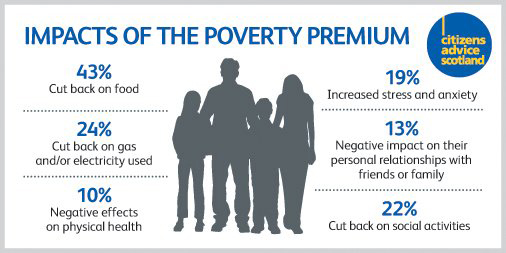The Poverty Premium in Scotland
Ipsos was commissioned by Citizens Advice Scotland (CAS) to conduct research on the ‘poverty premium’ in Scotland – the tendency for low income consumers to pay more than those on higher incomes for essential goods and services – including energy and telecommunications services, insurance policies and credit contracts – owing to the nature of pricing structures, products and tariffs available in the markets concerned.
The research comprised two elements:
- a telephone survey of 1,000 consumers in Scotland (aged 16 and over)
- follow-up in-depth interviews among 32 low income respondents to the survey.
The findings of the research highlighted evidence of a poverty premium among low-income households, who were more likely than higher income households to use expensive payment options such as electricity prepayment meters (PPMs) and pay as you go mobile phones. Low earners were also more likely than those on a higher income to use more expensive types of credit, such as those offered by pawn brokers, and less likely to use credit cards or take out bank or building society loans. While some were aware that their credit choices meant they were often paying more in the long run, others had taken out credit or loans without fully understanding the cost implications.
The research also provided clear evidence that living on a low income had significant impacts on those affected. These included a need to cut back on other areas of expenditure, including spending on food; and a number of more ‘personal’ impacts, from health problems to relationship difficulties.

The findings of the research will be used by CAS as part of their Fairer Scotland Action Plan, to work together with those who supply essential services and persuade them to bring down costs and offer better deals to those on low incomes.
- The full research report can be accessed on the CAS website.



